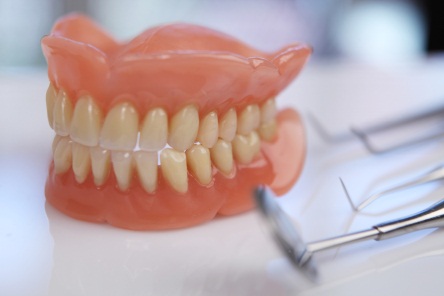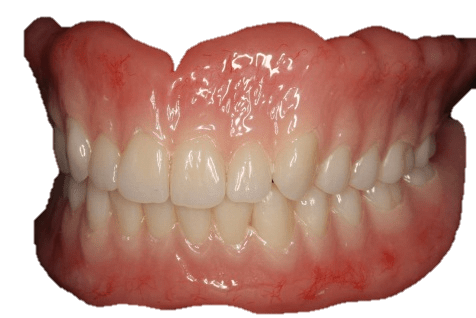 Complete Denture is a removable replacement of full complement of missing teeth .They are made of acrylic resin. Fabrication of complete dentures is an elaborate and technique sensitive procedure, meticulously carried out at fms by our dedicated prosthodontic team in EUGENE.
Complete Denture is a removable replacement of full complement of missing teeth .They are made of acrylic resin. Fabrication of complete dentures is an elaborate and technique sensitive procedure, meticulously carried out at fms by our dedicated prosthodontic team in EUGENE.
Complete Dentures
The complete denture treatment modalities available at FMS include:
Acrylic complete denture : Conventional and Immediate

BPS dentures ( Bio-functional Prosthetic system)

Implant retained overdetures
Are you a candidate for complete dentures??
Complete dentures are given after all the teeth have been lost/removed. So, ideally the treatment should start only after the tissues have healed well. But, in some instances because of social and aesthetic concerns, the patient may not be able to go through a phase without teeth. So, in such cases, taking the patients’ requirements into consideration, an immediate denture can be delivered right after removal of the front teeth.
Complete dentures can be either “conventional” or “immediate.” Made after the teeth have been removed and the gum tissue has begun to heal, a conventional denture is ready for placement in the mouth about eight to 12 weeks after the teeth have been removed.
Unlike conventional dentures, immediate dentures are made in advance and can be positioned as soon as the teeth are removed. As a result, the wearer does not have to be without teeth during the healing period. However, bones and gums shrink over time, especially during the healing period following tooth removal. Therefore a disadvantage of immediate dentures compared with conventional dentures is that they require more adjustments to fit properly during the healing process and generally should only be considered a temporary solution until conventional dentures can be made.
Replacing missing teeth enhances your oral, general health and your appearance. Dentures also improve a person’s ability to speak and to eat.
The denture development process takes 6-7 appointments. Once your prosthodontist determines what type of appliance best suits you, the general steps are to:
- Make a series of preliminary and final impressions of your jaw and take measurements of how your jaws relate to one another and how much space is between them.
- Fabrication of models, wax patterns, and/or plastic patterns in the exact shape and position of the denture will be made. You will “try in” this model and the denture will be assessed for colour, shape, and fit before the final denture is cured.
- Cast a final denture
- Adjustments will be made as necessary.
- Recall and assessment of denture
Visiting the dentist regularly will not only help keep your teeth and mouth healthy, but will also help keep the rest of your body healthy.
Dental care is important because it:
- Helps prevent tooth decay
- Protects against periodontal (gum) disease, which can lead to tooth and bone loss
- Prevents bad breath – brushing, flossing, and seeing the dentist regularly will help reduce the amount of bad-breath causing bacteria in your mouth.
- Gives you a more attractive smile and increases your self-confidence
- Helps keep teeth looking bright by preventing them from becoming stained by food, drinks, and tobacco
- Strengthens your teeth so that you can enjoy healthy, beautiful smiles for the rest of your life!
Dentures are made to closely resemble your natural teeth so it will enhance your overall personality and improve your smile and built you with more confidence.
Eating with new dentures will take a little practice and may be uncomfortable for some wearers for a few weeks. Your prosthodontist will guide during this phase.
New dentures may feel a little odd or loose for a few weeks until the muscles of the cheeks and tongue learn to keep them in place and you get comfortable inserting and removing them. Also, it is not unusual for minor irritation or soreness to occur and for saliva flow to increase when you first start wearing dentures, but these problems will diminish as the mouth adjusts.
After getting dentures, you may have difficulty pronouncing certain words. If so, practice by saying the difficult words out loud. With practice and with time you will become accustomed to speaking properly with dentures.
Your dentist or prosthodontist will instruct you as to how long to wear dentures and when to remove them. Minor adjustments will be done during your first check-up appointment, after this you should remove dentures before going to bed. This allows gum tissues to rest and allows normal stimulation and cleansing by the tongue and saliva. The denture can be placed back in the morning.
A denture adhesive may be considered under the following circumstances:
- To enhance satisfaction with a properly constructed denture. Adhesives enhance retention, stability, bite force, and an individual’s sense of security.
- To assist individuals with dry mouth conditions that lessen denture adherence, such as individuals taking cold medications, those with neurologic disabilities including strokes, and the elderly.
- To provide added stability and security for those who place unusual demands on facial muscles, such as public speakers or musicians.
There are situations when denture adhesives should not be used. Those cases include:
- When it is used as a “fix” for ill-fitting or poorly constructed dentures. If dentures begin to feel loose, cause discomfort or cause sores to develop, contact your dentist as soon as possible.
- When a dentist has not evaluated dentures for a long time. Dentures rest on gum tissue and the jawbone, which shrink and deteriorate, respectively, over time. Therefore, the real problem might be a need for a denture adjustment or new dentures.
- When oral hygiene practices cannot be sustained.
- When any known allergy exists to the adhesive’s ingredients.
Here are some tips to consider when applying denture adhesives:
- Distribute the adhesive evenly on the tissue bearing surface of the denture.
- Apply or reapply when necessary to provide the desired effect.
- Always apply the adhesive to a thoroughly clean denture.
- Remember adhesives work best with a well-fitting denture.
Yes, dental implants can be used to support cemented bridges, eliminating the need for a denture. The cost is usually greater, but the implants and bridges more closely resemble the feel of real teeth. Dental implants are becoming the alternative to dentures but not everyone is a candidate for implants. Consult your dentist for advice.